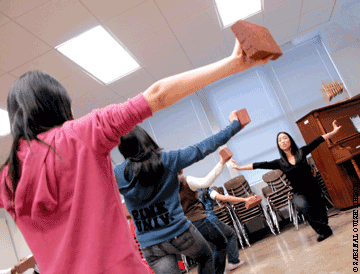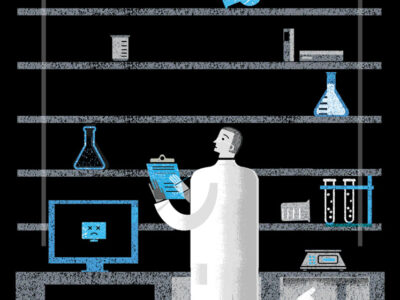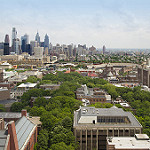
Class of ’93 | Like every newly minted urban teacher, Helen Gym C’93 GEd’96 quickly began learning some unexpected lessons. But when, a few years into her stint at Philadelphia’s Lowell Elementary School, a Philadelphia Daily News columnist accused the school of extending preferential treatment to its Asian-American students, the ensuing controversy far exceeded the usual youthful travails.
“The series was upsetting to so many people because it took a difficult situation—the public education of students in Philadelphia—and added a layer of race,” says Gym. “It fed off of most people’s very real, and grounded, fears about the quality of education of their children, and played into anti-immigrant and anti-Asian sentiments.”
The Olney section was home to a “huge influx of immigrants in the ’90s,” she adds, “and our school was struggling with understanding the needs and meeting the demands of immigrant students and families.” Asian Americans and African Americans each made up about a third of the student population.
“I realized that even as a young teacher with a lot of passion and desire to see things change, I was not going to be able to figure it out by myself,” Gym recalls. “I could only protect students as far as the classroom.”
She left teaching because she “had to understand this injustice,” she says. “I had to understand how to tackle head-on the fears and anger and needs that people desperately want to have addressed. This is not something you learn in graduate school.”
The contretemps set Gym on a dual path of activism: advocating for public education and for Asian Americans. Most recently, it prompted her to found Parents United for Public Education, which maintained an active presence during Philadelphia’s School Reform Commission meetings, and successfully lobbied for more than $28 million for public schools.
For that work, The Philadelphia Inquirer named Gym last year’s Citizen of the Year, noting that Parents United’s “grassroots efforts reach across economic, political, and racial divides”—and, more important, they “produce results.”
While she appreciates the kudo, “the real importance is the recognition that there’s hope on the issue of public education,” she says. “You can always feel movement in your circle, but it’s different when the work is acknowledged beyond your normal scope. You start realizing that a lot of people are feeling the change.”
Parents United started as a group of fed-up parents at West Philadelphia’s Samuel Powel Elementary School, where Gym’s daughter was a student. “We were sick and tired of losing teachers, losing art and music classes, begging for crumbs, and getting less and less,” Gym says. “Some try to solve such issues by seeing if they have connections—I think it’s stronger if you go out and talk.” Their efforts soon mushroomed into a citywide association.
“We’re not interested in patchwork solutions,” Gym says. “We want true investment, and one that’s brought to every single corner of the city. It’s always about the options and the choices we make. We question very strongly why we can’t fund our public schools in the richest country in the world.”
Gym, who is of Korean descent, is equally passionate about Asian-American issues. “A lot of my work has to do with ethnic politics and how you organize around ethnic issues,” she says.
Having served in various capacities at Asian Americans United since 1994, Gym sees her involvement there as strongly connected with her other volunteer work.
“For example, at AAU, one of our more successful issues was to stop a stadium from being built in Chinatown. Our approach was: Do we as a community want to spend our money on that or do we want to see the money spent elsewhere? By positioning our opposition in those terms, the issue was really about neighborhoods, the future of a city, the money we spend, and where we spend it.”
And, as she has repeatedly stated, children are that future.
“They’re the reason I even do any of this,” she says. “It’s not a stepping stone, not a job. This is our life. If my child has a bad day at school, it ruins my night at home.”
— JoAnn Greco




